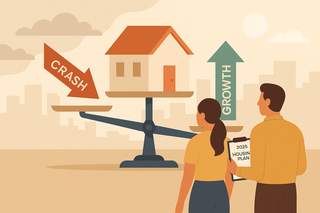With home prices still high, interest rates fluctuating, and economic uncertainty looming, it’s a question on everyone’s mind:
Will the housing market crash in 2025?
Whether you’re a homeowner, aspiring buyer, or real estate investor, understanding the housing market outlook can help you make smarter decisions about buying, selling, and investing.
In this article, we’ll examine expert predictions, economic trends, warning signs of a crash — and what history tells us about where the market could be headed in 2025.
What Does a “Housing Market Crash” Really Mean?
A housing crash typically refers to a sudden, sharp decline in home prices, often triggered by:
-
Economic recession
-
High unemployment
-
Excessive mortgage debt
-
Foreclosures flooding the market
-
A burst real estate bubble (like 2008)
This can lead to:
-
Negative home equity (owing more than your home is worth)
-
Difficulty selling properties
-
Mortgage defaults
-
A chain reaction across the economy
But not all price drops are crashes. A correction (5–10% decline) is different from a crash (20–40% drop or more).
What Happened in 2020–2024?
Let’s recap the recent housing landscape:
-
🔼 2020–2022: Prices surged due to record-low interest rates, remote work, and supply shortages.
-
💰 Investors jumped in, further pushing prices up.
-
📉 2023–2024: Rising interest rates slowed demand, causing sales to fall — but prices largely stayed stable or only slightly declined.
So the big question now is…
Will the Housing Market Crash in 2025?
🔍 Most Experts Say: Unlikely — But Risk Remains
While there are challenges ahead, most analysts don’t expect a full-blown crash in 2025. Here’s why:
✅ 1. Low Inventory Is Supporting Prices
There’s a nationwide housing shortage — especially in affordable homes.
Even as demand softens, supply remains tight, preventing dramatic price drops.
✅ 2. Lending Standards Are Stricter Than 2008
Banks now require better credit and documentation.
There are fewer risky loans, meaning fewer defaults and foreclosures.
✅ 3. Millennials Are Creating Strong Demand
The largest generation in U.S. history is in peak home-buying years — fueling long-term demand.
✅ 4. Homeowners Have Equity
Unlike 2008, most homeowners today have significant equity, thanks to years of rising prices and larger down payments.
🚩 However, There Are Warning Signs...
Some economists are more cautious. Here’s what they’re watching:
-
Interest Rate Volatility: If rates stay high or rise further, demand could fall sharply.
-
Economic Uncertainty: Recession, job losses, or inflation spikes could reduce buying power.
-
Affordability Crisis: Many Americans are priced out, especially first-time buyers — this could cool demand long-term.
-
Regional Bubbles: Some overheated markets (like Austin, Boise, or parts of California) may see larger corrections than national averages.
What If a Correction Happens?
If prices drop 5–15% in 2025, here’s how to think about it:
-
📉 Buyers: Could gain negotiating power — especially with motivated sellers.
-
💡 Sellers: May need to adjust pricing expectations and stage homes well.
-
🏦 Investors: Might find better deals — especially with strong cash flow.
-
🏠 Homeowners: If you’re not selling, a short-term correction doesn’t change your long-term equity or use of the home.
Remember: Real estate is cyclical. What goes up may come down — but not always catastrophically.
What History Tells Us
Here’s what previous cycles suggest:
| Year | Market Event | What Happened |
| 2008 | Housing crash |
Home prices fell 20–40%, banks failed, foreclosures surged
|
| 2020 | COVID shock |
Prices soared due to low rates and demand spike
|
| 2023–24 | Rate hikes |
Sales dropped, prices softened in some regions
|
The 2025 market may cool, but another 2008-style crash is unlikely unless a major economic shock occurs.
Should You Buy or Wait in 2025?
There’s no perfect answer — it depends on your goals.
Buy Now If:
-
You plan to stay in the home 5+ years
-
You’ve locked in a good rate and stable payment
-
You’ve run the numbers and it fits your budget
Wait If:
-
You’re betting on a price drop
-
You’re not financially ready
-
You don’t plan to stay long (risk of short-term loss)
Learn how to get financially stable before a major purchase:
📘 9 Steps on How to Become Financially Stable
How to Prepare for Any Market
Whether it’s 2025 or beyond, smart financial planning helps you win in any housing cycle:
-
🧾 Pay off high-interest debt
-
📈 Build strong credit
-
💵 Save aggressively for a down payment
-
🧠 Understand the difference between gross pay and net pay so you budget properly (learn more here)
-
🧮 Invest early and consistently to grow your wealth (here’s why)
Final Takeaway: Watch, Prepare — But Don’t Panic
Will the housing market crash in 2025?
Probably not — but it may cool or correct in some areas.
The key is to:
-
Stay informed
-
Strengthen your financial position
-
Buy only when it makes sense for your life, not just the market
Because whether the market rises or falls — your smartest move is always being prepared.
